Photo: Alberto E. Rodriguez/WireImage.com
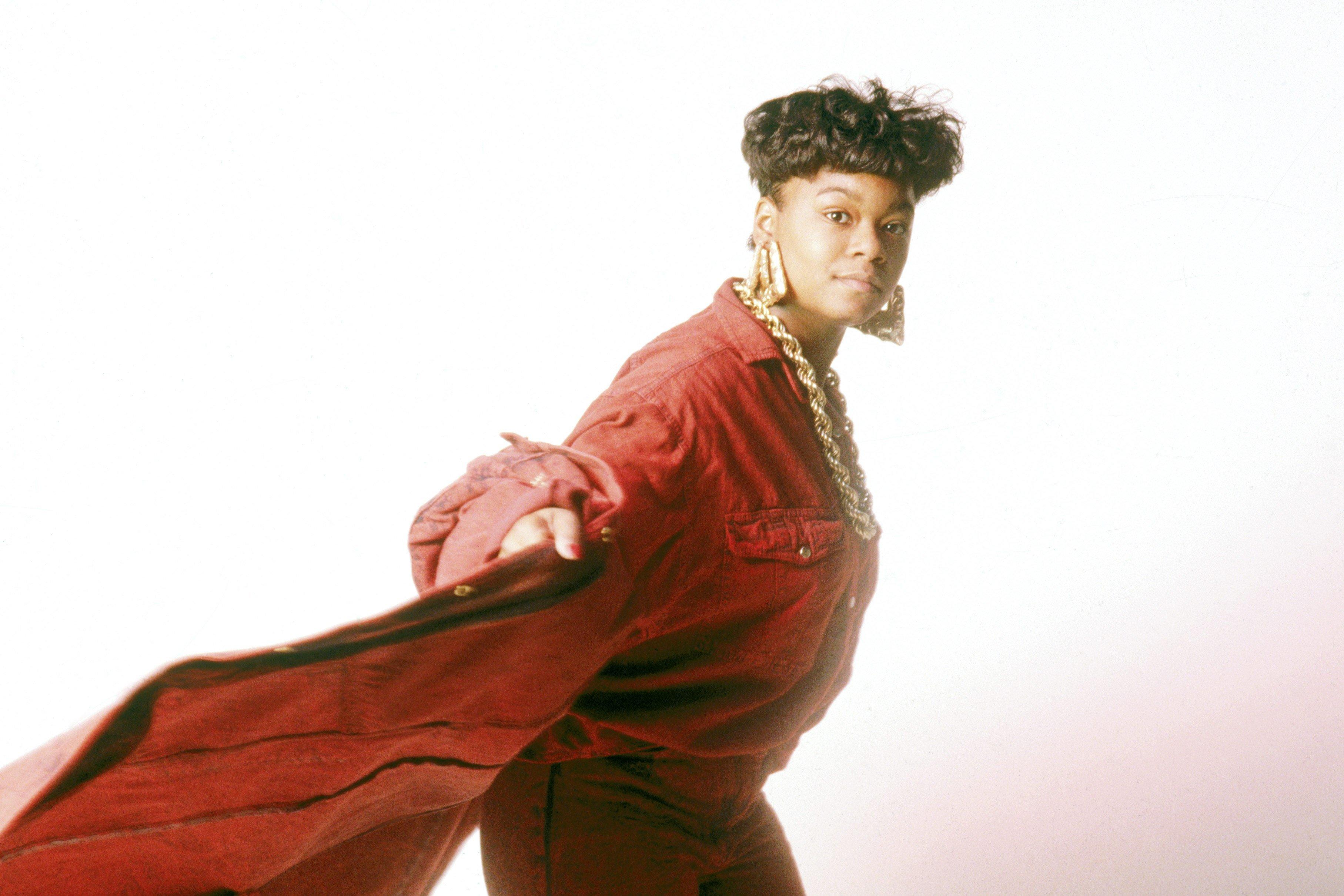
Roxanne Shanté circa 1988
news
Roxanne Shanté: Biopic Reveals The Story Of A Hip-Hop Music Pioneer
Ahead of the Netflix premiere of 'Roxanne Roxanne,' go inside the lasting influence and legacy of the indomitable emcee
Throughout history, many important movements have omitted the significant contributions of women. History simply became his-story. The same is true in hip-hop, a genre that is historically and largely dominated by men.
<iframe width="620" height="349" src="https://www.youtube.com/embed/IKA8H_LolNM" frameborder="0" allow="autoplay; encrypted-media" allowfullscreen></iframe>
But hip-hop pioneer Lolita "Roxanne Shanté" Gooden is adding more proof that #TimesUp with her new biopic, Roxanne Roxanne, which premieres March 23 on Netflix.
Starring Chanté Adams (portraying Roxanne Shanté) and Mahershala Ali, the movie takes viewers back to the early '80s when the fiery Queens, N.Y., rapper emerged as a streetwise hip-hop teen legend on the strength of her recording of "Roxanne's Revenge," which is cited as the first (ever!) battle response song recorded and released in hip-hop.
As the film spotlights, before female hip-hop artists like MC Lyte, Queen Latifah, Salt-N-Pepa, Lauryn Hill, and Lil' Kim sold millions of albums, the young Shanté was in the trenches fighting for a spot that already belonged to her and laying the groundwork for the great women who would follow in her footsteps.
"We all stand on the shoulders of someone," says GRAMMY nominee MC Lyte. "Because she was a solo artist so early on, she paved the way when it came to people being able to accept a female MC as an entity of its own."
That might be one of the reasons executive producers of the film, Mimi Valdes and Nina Yang Bongiovi, reached out to Shanté about making a movie. While hosting an event for the American Black Film Festival, Shanté remembers being approached by the ladies.
"They came down from the balcony after the show," Shanté recalls. "We've been looking for you and we want to make a movie about your life."
Within a year's time, Shante was at the Sundance Film Festival with a critically acclaimed movie about battling both on and off the mic.
Hip-hop was born in New York City. Before anyone had even given the music genre a name, Shanté was in the thick of it. Raised in gritty Queensbridge — the nation's largest public housing development and home to hip-hop legends such as MC Shan, Nas and Mobb Deep — Shanté was a ferocious competitor who played with verbs and nouns on street corners. In 1984, when she was only 14 years old, Shanté recorded the epic "Roxanne's Revenge" at the apartment of DJ Marley Marl, a neighbor and music producer.
<iframe width="620" height="349" src="https://www.youtube.com/embed/z93Qxl51g4M" frameborder="0" allow="autoplay; encrypted-media" allowfullscreen></iframe>
It was a powerful, unforgettable and game-changing rebuttal to UTFO's "Roxanne, Roxanne," a song about a woman named Roxanne who ignored the group's advances. Shanté's lyrics were delivered off the top of her head — no pad and no pen — and she literally did it in between laundry loads. On that night, she adopted the name Roxanne, added her middle name Shanté into the equation and emerged as a rechristened shining star.
"I was about 14 or 15 years old sitting in my living room in London when I first heard Roxanne Shanté," recalls Monie Love, British MC and member of the legendary hip-hop group Native Tongues. "She was articulate, smart and just a beast. She gave the guys what they dished out but with a woman's touch. She didn't have to become a man to beat a man, and I loved that."
Take Note: Women In Music
Indeed, Shanté was a powerhouse. Her voice and heart were bigger, stronger and more powerful than her petite teenage frame. She was brave, maybe even the bravest.
"She went toe to toe with the guys and that was exciting," recalls MC Lyte. "It was unbelievable."
"Roxanne's Revenge" would go on to sell more than 250,000 copies and spark the "Roxanne Wars," one of the most infamous and longest-running feuds in hip-hop. She had tapped into something — a girl beating the guys at their own game. She was hip-hop through and through but she was still a young teen, and many didn't think the two made a good couple. Case in point, Shanté recalls entering a rap competition that crowned the winner with a "best rapper” distinction.
"I went against 11 opponents in one day. All men," says Shanté, who remembers the whispers about how great her performance was throughout the day, which led her to feel confident that she'd win. "Kurtis Blow, who I'm great friends with today, was one of the judges, and he asked what it would take for me to lose. They told him that Shanté would lose if he gave her a 2."
And he did. Shanté was crushed. She had won but lost.
"[Roxanne Shanté] paved the way when it came to people being able to accept a female MC as an entity of its own." — MC Lyte
Despite these types of obstacles, Shanté has the spirit of a champion. She continued as a force in hip-hop as a member of the groundbreaking hip-hop collective Juice Crew. She released two solo albums, 1989's Bad Sister and 1992's The B*** Is Back, but neither achieved major mainstream success. Always up for a battle, she waged war against a slew of popular female rappers in 1992 with her single "Big Mama."
"She dissed all of us rappers by name. But I didn't respond," Monie Love remembers. "I had too much respect for her to answer back. She empowered me and inspired me to become a rapper."
<iframe src="https://tools.applemusic.com/embed/v1/album/330089743?country=us" height="500px" width="100%" frameborder="0"></iframe>
That's the funny thing when it comes to women in hip-hop. There can only be one queen. While the genre is competitive by nature, history has shown that men often collaborate and work well together. Women, on the other hand, are often pitted against each other.
"It's just the way it’s been structured for women in hip-hop," Shanté says.
But there's so much more to Shanté's story. Life doesn't suddenly end once the music stops, and it doesn't restart once a movie is made about you. Life is all the stuff in between and beyond. For Roxanne Shanté, it's about being a survivor, pioneer, trailblazer, mother, wife, friend, daughter, and an unbreakable spirit. Her life is marked by the power of believing in yourself despite what the world keeps showing you.
Years after that rap competition, Shanté bumped into Kurtis Blow. He told her that she really had won that rap battle years ago.
"At that time, hip-hop was just getting started, and people were starting to get major [record] deals," she recalls. "There was no way hip-hop was going to be taken seriously if the best of the best was a 15-year-old girl."
Too bad hip-hop didn't know who it was back then.
Catching Up On Music News Powered By The Recording Academy Just Got Easier. Have A Google Home Device? "Talk To GRAMMYs"
(Lakeia Brown is a freelance writer and host of the podcast, Decoded with Elle Bee. She has been published in publications like O, The Oprah Magazine, Essence and Complex. You can follow her on IG @decodedwithellebee.)

Photo: Amy Lee
list
5 Rising L.A. Rappers To Know: Jayson Cash, 310babii & More
From San Diego to the Bay Area, Seattle and beyond, the West Coast bursts with talent. Los Angeles is at the heart of this expanse, and these five rappers are just a few who are showcasing the vibrant sounds of West Coast hip-hop.
GRAMMY winners Kendrick Lamar and Mustard have long repped their California roots. Earlier this summer, their powerhouse anthem "Not Like Us" brought West Coast rap back to its roots and shone a global spotlight on the scene.
Lamar and Mustard are at the forefront of a renaissance in West Coast rap. Their shared roots in Southern California cities — Mustard from Los Angeles and Kendrick from Compton — adds authenticity and resonance to their partnership. Their undeniable chemistry was on display in the video for "Not Like Us," which received a million views less than an hour after its release.
Mustard's signature beats and Lamar's profound lyricism has resurfaced the sound and culture that makes West Coast rap so unique and paved the way for a new generation of artists. All signs suggest that another impactful collaboration may appear on Mustard's upcoming album, Faith of A Mustard Seed.
Learn more: A Guide To Southern California Hip-Hop: Definitive Releases, Artists & Subgenres From L.A. & Beyond
Kendrick Lamar headlined the electrifying Pop Out concert on Juneteenth, which also featured sets from Mustard and DJ Hed. The event saw a handful of L.A. rappers, opening for Lamar in a showcase of the vibrant talent that defines the region's rap scene.
The West Coast is a vast reservoir of talent, stretching from the Bay Area to Seattle. At the heart of this creative expanse is Los Angeles, which brings fresh perspectives, innovative styles, and renewed energy to hip-hop, ensuring the genre thrives. With the stage set for these newcomers to shine, it's the perfect time to take a closer look at some of the rising talents poised to impact the rap scene. While this list only scratches the surface, it offers a glimpse into the diverse and exciting talent from SoCal, the epicenter of the West.
Blxst
Arising from Los Angeles, Blxst initially played the background as a producer but soon demonstrated his ability to excel across all facets of music creation. Blxst's breakout moment came with his platinum-certified single "Chosen," which solidified his place in the music industry. His collaboration on Kendrick Lamar's "Die Hard" from Mr. Morale And The Big Steppers further showcased his skill for crafting hooks that elevate tracks, resulting in two GRAMMY nominations.
As he prepares to release his debut album, I'll Always Come Find You on July 19, Blxst stands at a pivotal point in his career. With a great resume already to his name, his forthcoming album promises to showcase his undeniable talent and leave a lasting impact on the West Coast music scene.
Bino Rideaux
Bino Rideaux is a South Central native and frequent collaborator with the GRAMMY-winning rapper Nipsey Hussle. He is the only artist to have a joint project with Hussle, No Pressure, released before the prolific rapper's untimely death. Rideaux has hinted at having a treasure of unreleased music with Hussle, saved for the perfect moment and album.
Rideaux is known for creating tracks that get the city outside and dancing. He has made three beloved projects with Blxst, titled Sixtape, Sixtape 2, and Sixtape 3 resulting in sold-out shows and a special place in West Coast Rap fans' hearts. Endorsed by industry heavyweights like Young Thug, Rideaux continues to carve his path at his own pace. His journey is nothing short of a marathon, echoing the enduring legacy of his mentor.
Kalan.FrFr
Kalan.FrFr, whose name stands for "For Real For Real," is an artist whose music is as genuine as his name suggests. Growing up in Compton and Carson, Kalan.FrFr has always stayed true to his roots, and exudes the unyielding confidence essential to making it in the City of Angels.
His breakthrough mixtape, TwoFr, showcased his ability to shine without major features, delivering verses with catchy hooks and melodic rap. He's shown he's not confined to one sound, delivering vulnerable tracks like "Going Through Things'' and "Never Lose You." His EP Make the West Great Again, Kalan.FrFr both proves his loyalty to his origins and highlights his versatility. Kalan.FrFr's signature punch-in, no-writing-lyrics-down style keeps his fans on their toes, ensuring that whatever comes next is unpredictable but authentic.
Jayson Cash
Jayson Cash, a rapper hailing from Carson — the same city as TDE artist Ab-Soul — stays true to West Coast rap, from his lyrics to his beat selection. Listening to Jayson Cash's music is like diving into a vivid life narrative. His prowess as a lyricist and storyteller shines through in every verse. He gives his fans an insight into his journey, making it a relatable music experience.
Cash made waves with his debut mixtape, Read The Room, and scored a Mustard beat on the song "Top Down." Two years later, their collaboration continues, with Cash writing on Mustard's upcoming album. Though often seen as an underdog, Cash is not to be underestimated, earning cosigns from West Coast legends like Suga Free and Snoop Dogg. His latest project, Alright Bet, includes a notable feature from Dom Kennedy.
310babii
310babii has achieved platinum-selling status at just 18 years old, while successfully graduating high school. Yet 310babii's career began in seventh grade, when he recording songs on his phone showing early signs of motivation and creativity. His 2023 breakout hit "Soak City (Do It)" quickly gained traction on TikTok — and caught the ears of Travis Scott and NFL player CJ Stroud.
As the song grew in popularity, it led to a remix produced by Mustard, who invited the Inglewood native to join him onstage during his set at The Pop Out. 310babii's innovative spirit shines through in his distinctive visuals, exemplified by the captivating video for his song "Back It Up." His recent debut album, Nights and Weekends, released in February, underscores his evolving talent and promise within the music industry.
Latest News & Exclusive Videos

Behind Ryan Tedder's Hits: Stories From The Studio With OneRepublic, Beyoncé, Taylor Swift & More

Crowder Performs "Grave Robber"

NCT 127 Essential Songs: 15 Tracks You Need To Know From The K-Pop Juggernauts

5 Rising L.A. Rappers To Know: Jayson Cash, 310babii & More

Why Elliott Smith's 'Roman Candle' Is A Watershed For Lo-Fi Indie Folk
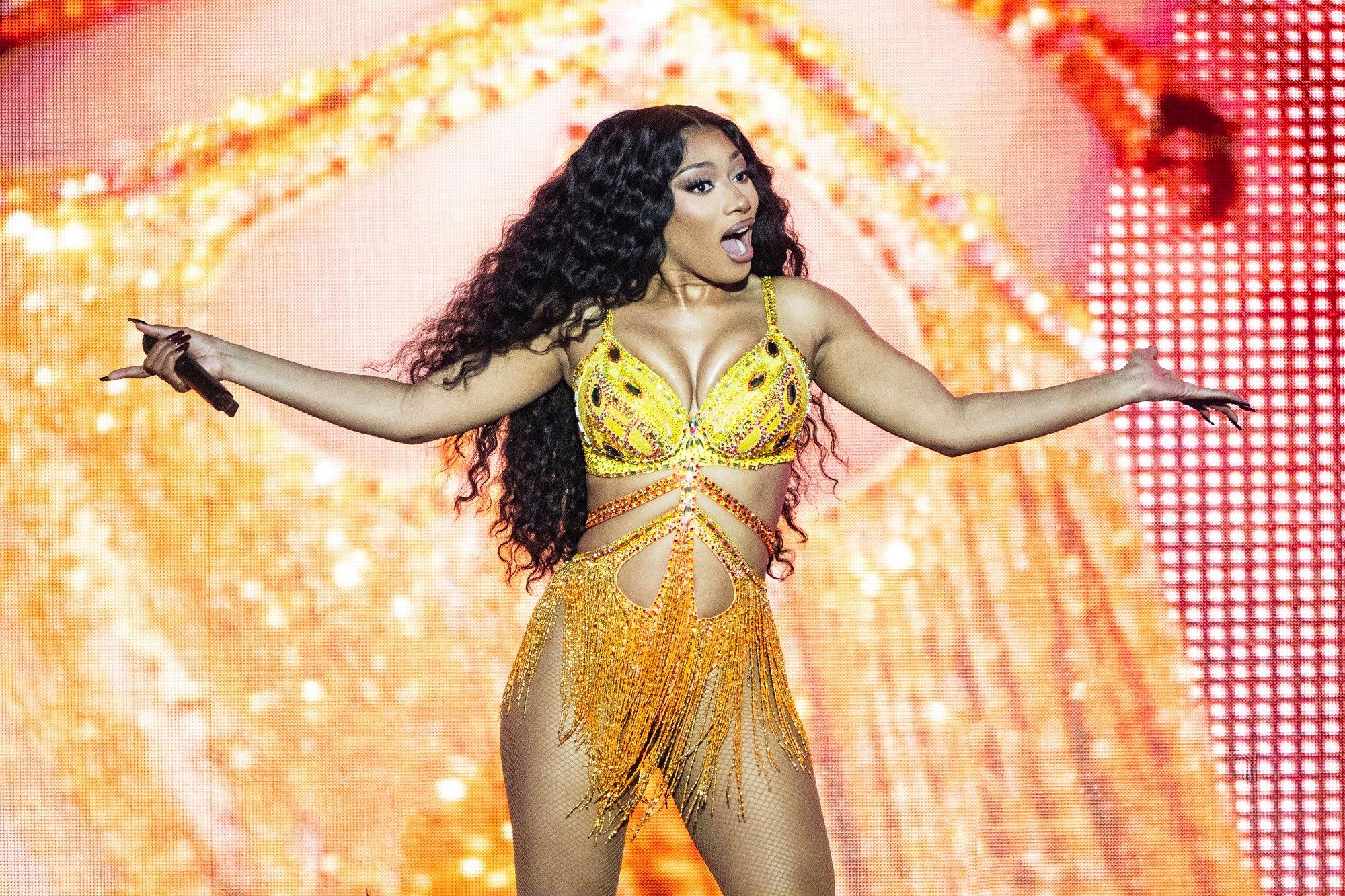
Photo: Erika Goldring/Getty Images
list
6 Takeaways From Megan Thee Stallion's 'Megan': Snakes, Shots & Self-Assurance
From the serpentine theme to Japanese rhyme schemes, Megan Thee Stallion's third album snatches back her own narrative and isn't afraid to take a bite.
Beware of venom: Megan Thee Stallion is not biting her tongue on her new album, simply titled Megan.
The GRAMMY winner's first full-length release in two years is also the first to drop under her own control. Fans have been ready for this release even before the first single, "Cobra," came out in November. The second single, "Hiss," followed in January and brought the star her first No. 1 hit on the Billboard’s Hot 100 and Global 200 charts. These songs, as well as the third single, "BOA," foreshadowed a certain slithery theme that helped shape the album.
Megan was released on June 28 and features guest stars such as GloRilla, Victoria Monét, Big K.R.I.T. and Kyle Richh as well as her longtime ace producers like Juicy J (who made "Hot Girl Summer" among other calling cards) and LilJuMadeDaBeat, who produced Stallion anthems like "Big Ole Freak," "Body" and "Thot S—."
Here’s what we learned from listening and vibing to the latest work by three-time GRAMMY winner Megan Thee Stallion.
A Theme Snakes Through Megan
As could have easily been predicted from the first three singles "Cobra," "Hiss" and "BOA," and now the album track "Rattle," there is a hint of a snake theme that wends its way through the album from beginning ("Hiss") to end ("Cobra").
In several songs, she denounces all the snake behavior that she has encountered from former lovers, friends, and haters who support those who have caused actual harm to her. In the music video for "Cobra," Megan literally sheds her old skin to reveal a shining new layer.
Megan Is Calling The Shots This Time
"I feel like Biggie, 'Who Shot Ya?’/But everybody know who shot me, bitch/ So now, let’s stop speaking on the topic," she rapped in "Who Me (feat. Pooh Shiesty)" off her 2022 album Traumazine. MTS was referencing the July 2020 incident in which rapper Tory Lanez shot her in the foot, and was subsequently charged with assault with a semiautomatic firearm and carrying a loaded, unregistered firearm in a vehicle.
Turns out, she wasn’t done referencing the topic. Now, she’s one taking the shots. MTS takes aim at less-talented women rappers on "Figueroa" (named for a Los Angeles street known for prostitution), and at Lanez on "Rattle," when she suggests that his male supporters should schedule a conjugal visit with him in prison. (Lanez is currently serving a 10-year sentence while simultaneously going through a divorce with wife Raina Chassagne.)
More Megan Thee Stallion News & Videos
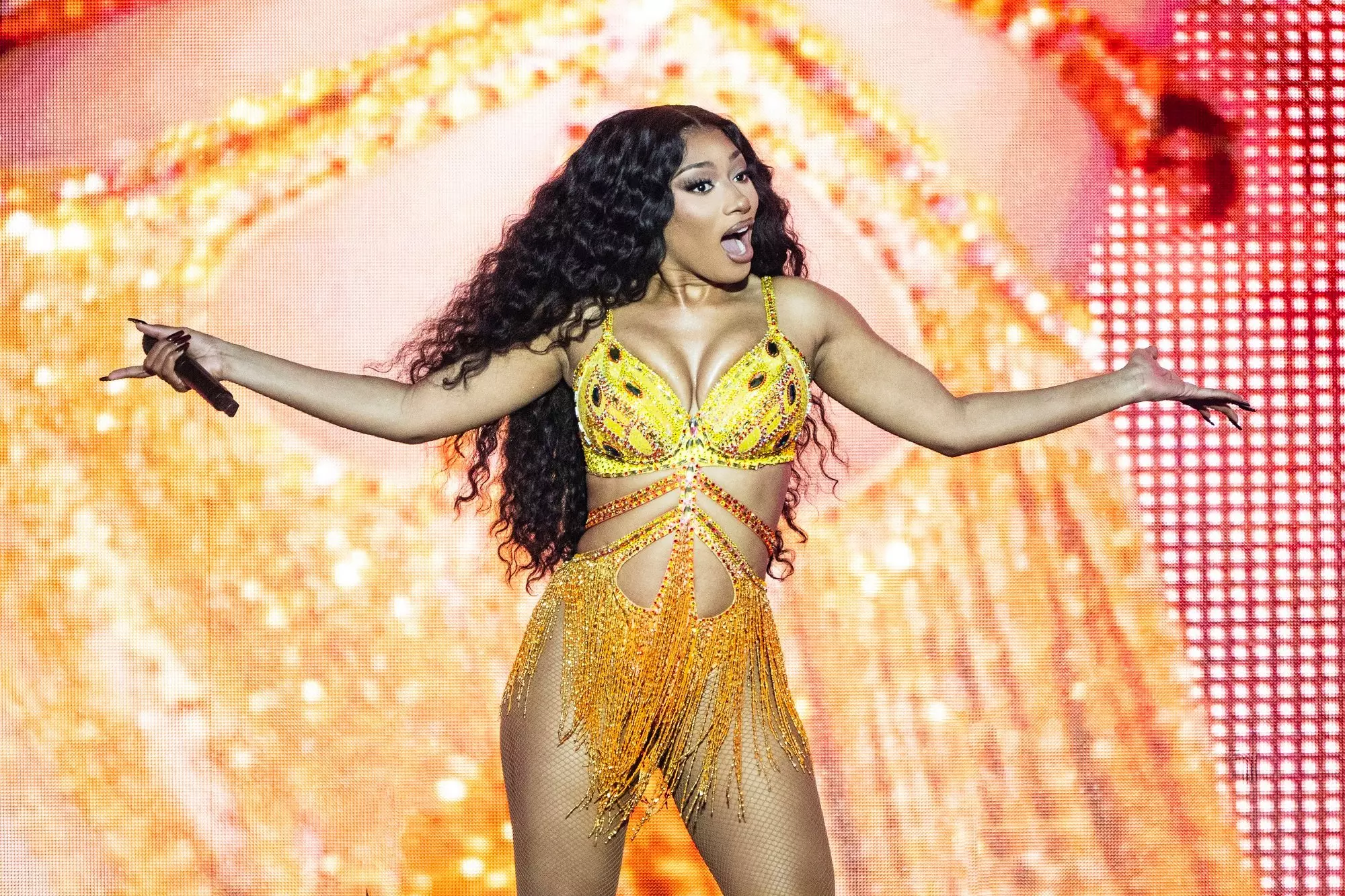
6 Takeaways From Megan Thee Stallion's 'Megan': Snakes, Shots & Self-Assurance
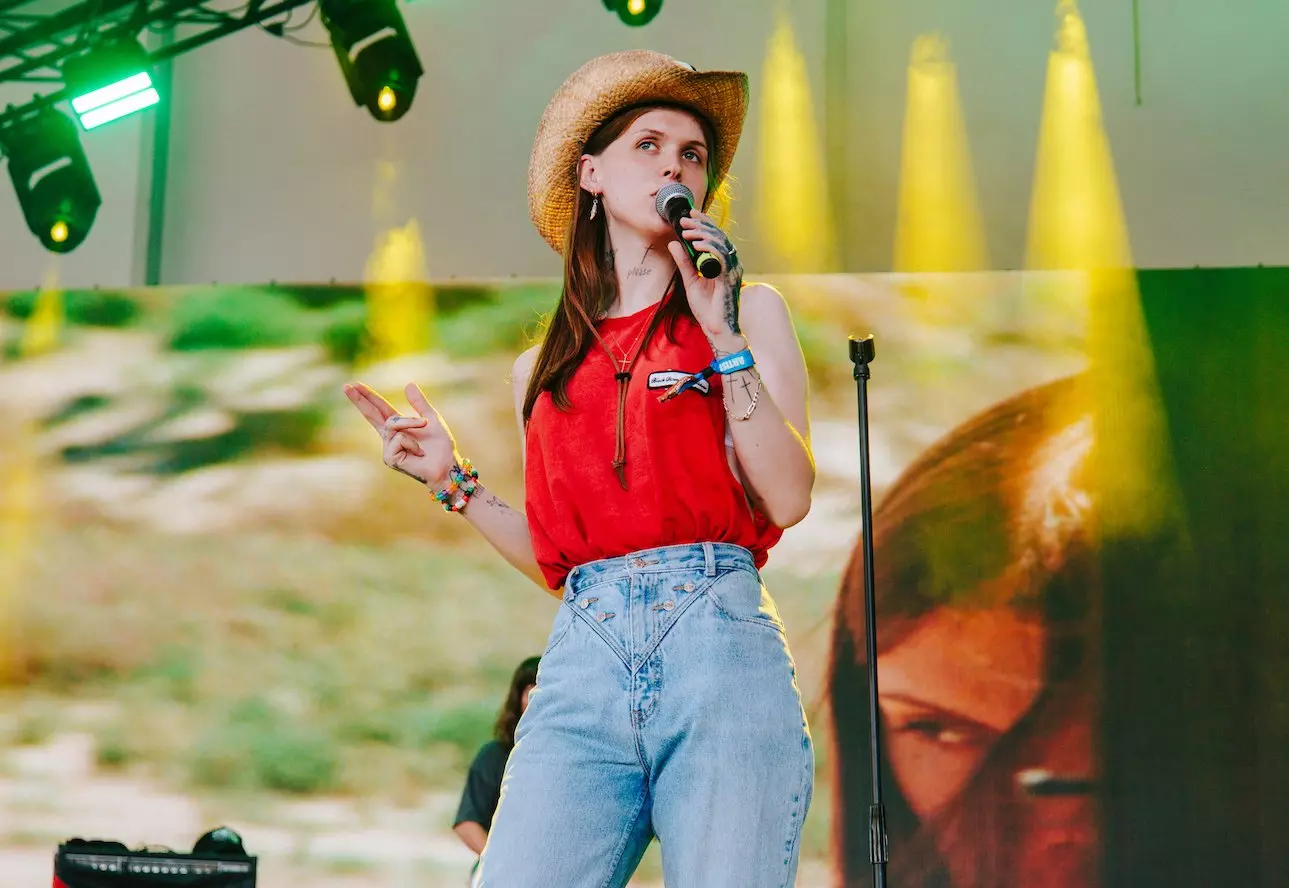
9 Epic Sets From Bonnaroo 2024: Ethel Cain, Melanie Martinez, Megan Thee Stallion & More
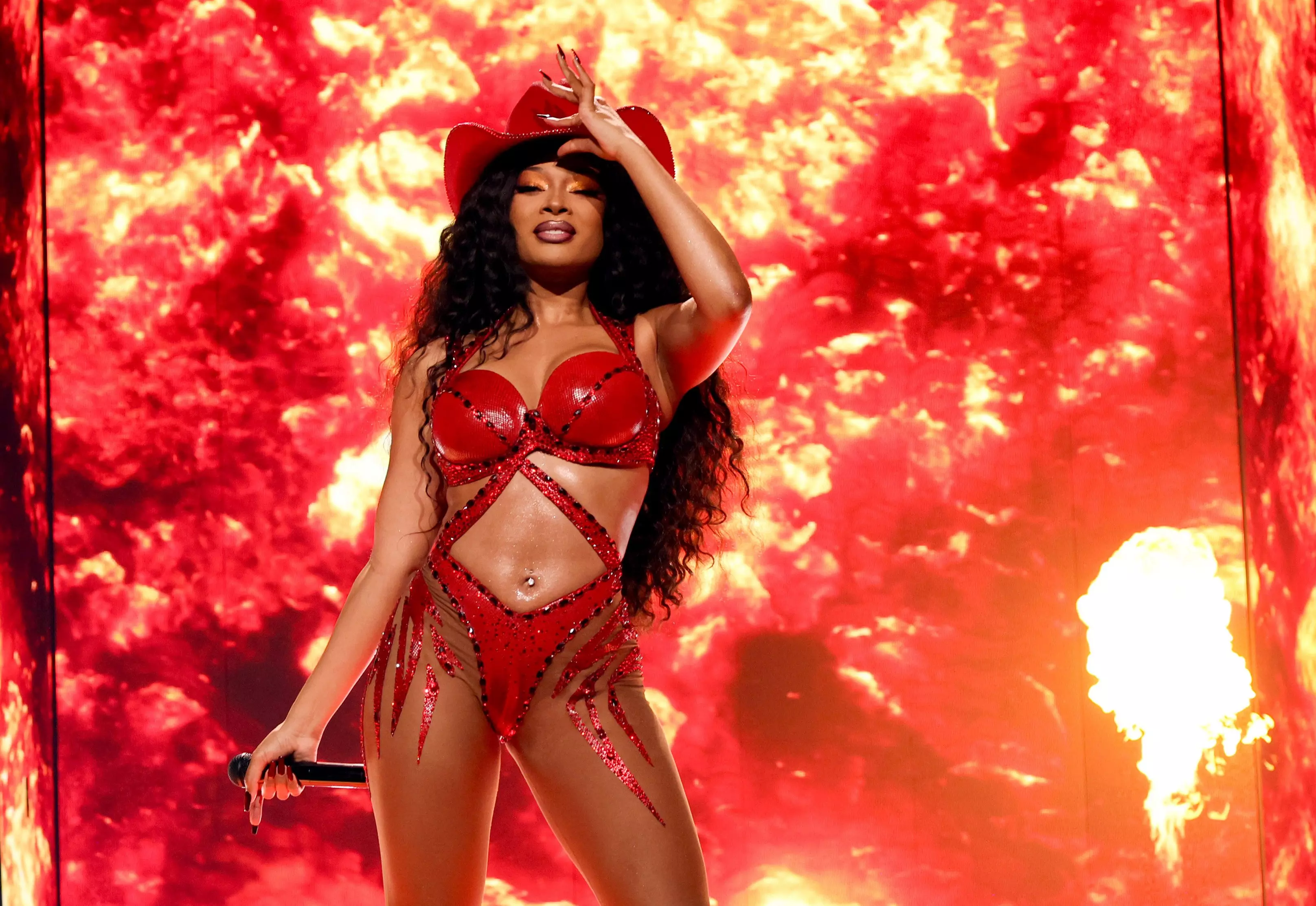
5 Iconic Moments From Megan Thee Stallion's Houston Hometown Shows
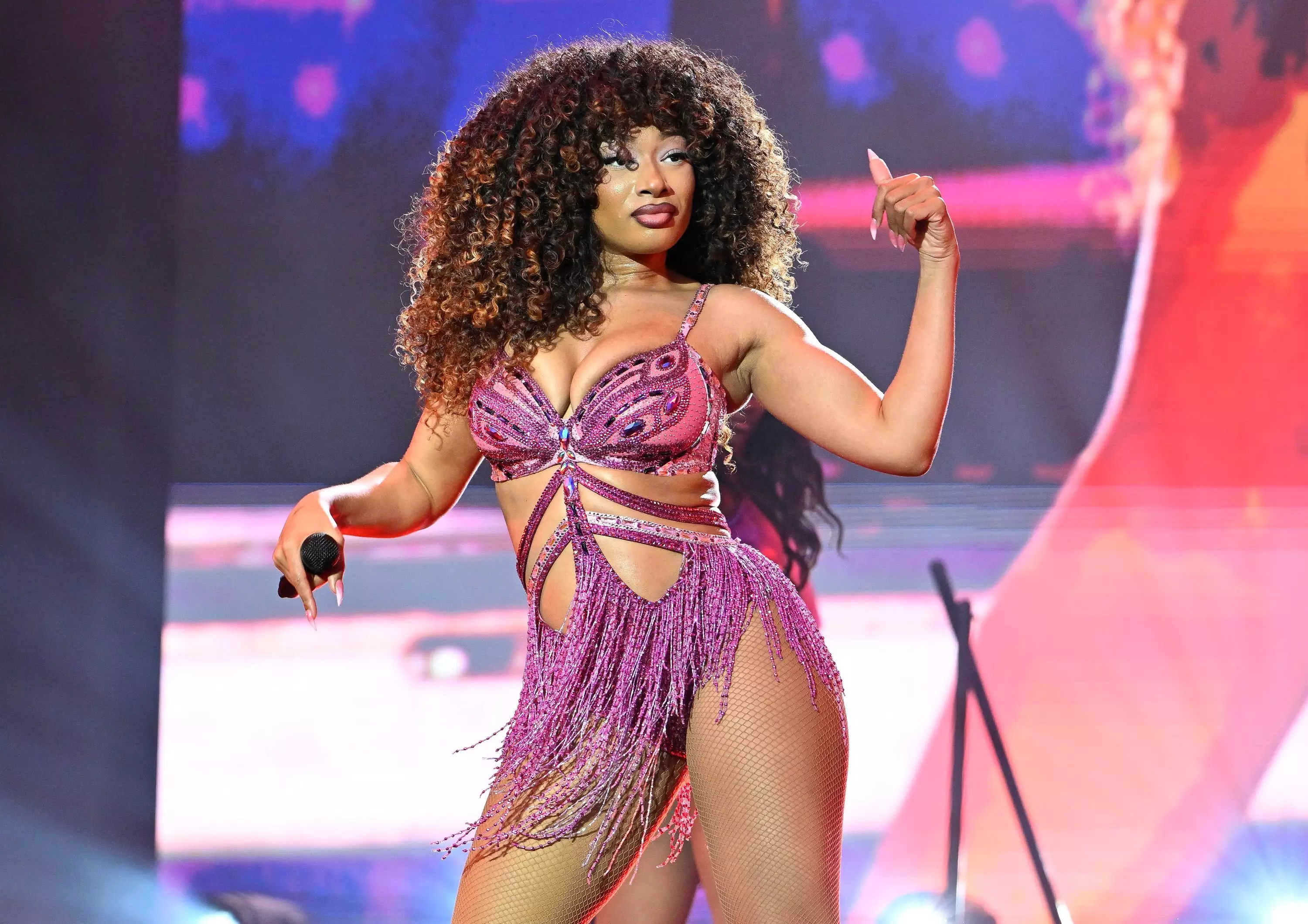
Everything We Know About Megan Thee Stallion's New Album 'Megan': Tracklist, Release Date & More
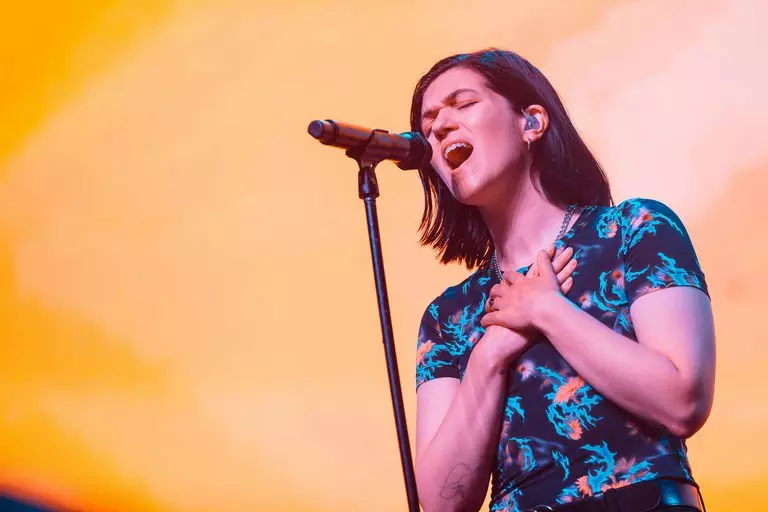
15 LGBTQIA+ Artists Performing At 2024 Summer Festivals
Inspiration Comes From Everywhere
The star and her collaborators incorporate unexpected musical influences on Megan via creative sampling. Megan Thee Stallion speeds up and flips Teena Marie's 1984 ballad "Out on a Limb" for "B.A.S." — a song she co-produced with her longtime ally LilJuMadeDaBeat. "BOA" is cleverly crafted from sounds in the first solo hit by Gwen Stefani, 2004’s "What You Waiting For?"
UGK are reunited from across the heavenly divide on the Juicy J-produced "Paper Together," with Bun B contributing new work and the late Pimp C joining in lyrical spirit. This is especially significant when considering that Juicy J produced "Intl’ Players Anthem (I Choose You)," UGK’s 2007 hit with Outkast. Juicy J also made the beats for Megan’s famous song "Hot Girl Summer."
That’s just the tip of the iceberg when it comes to samples waiting to be discovered on Megan. There are many more riffs and other musical notions that the sample bank in our brains have yet to detect.
Self-Love Is Queen
Whether she’s affirming, "I’m worthy, not worthless" on "Worthy," or literally touching herself in the auto-erotic "Down Stairs DJ" (which joins masturbation masterpieces like Divinyls’ "I Touch Myself" and Tweet’s "Oops"), Megan is grounded in songs that promote self-love as the best kind of love.
She does admit that this is sometimes a challenge to embody, as when she talks about lingering depression on "Moody Girl." But the album generally moves towards the light.
She Loves Japan
One of the big surprises on Megan is that she raps in two languages. She rhymes beautifully in Japanese on "Mamushi" with Yuki Chiba, a seasoned rapper from Japan who is influenced by the Southern swag. (Just take a look at the Memphis moves and Houston rhyme schemes of his viral song "Team Tomodachi.")
On "Otaku Hot Girl," she raps about the manga series "Naruto" and drops other anime references to show her love of Japanese pop culture.
Learn more: 10 Neo J-Pop Artists Breaking The Mold In 2024: Fujii Kaze, Kenshi Yonezu & Others
Megan's Game Is Tight
Megan is the first album to be released on Megan Thee Stallion’s own label. It follows her split from 1501 Certified Entertainment, a record label with which she was engaged in a protracted and ugly legal battle for earnings.
She now has the muscle of the major label Warner Brothers as a partner for her independent venture, Hot Girl Productions. She also recorded an Amazon Original song called "It’s Prime Day" for a commercial, as well as an exclusive Amazon edition of Megan.
It’s safe to say that this album represents a new level of business freedom and acumen for Megan Thee Stallion.
PRIDE & Black Music Month: Celebrating LGBTQIA+ & Black Voices

Celebrating 30 Years Of Essence Fest: How New Orleans & Multi-Generational, Diasporic Talent Create The "Super Bowl Of Culture"

Celebrating Missy Elliott: How The Icon Changed The Sound, Look & Language Of Hip-Hop

Tekno Talks New Music, Touring America & His "Elden Ring" Obsession

5 LGBTQIA+ Record Labels To Check Out: Get Better Records, So Fierce! And Others

Celebrate 40 Years Of Def Jam With 15 Albums That Show Its Influence & Legacy
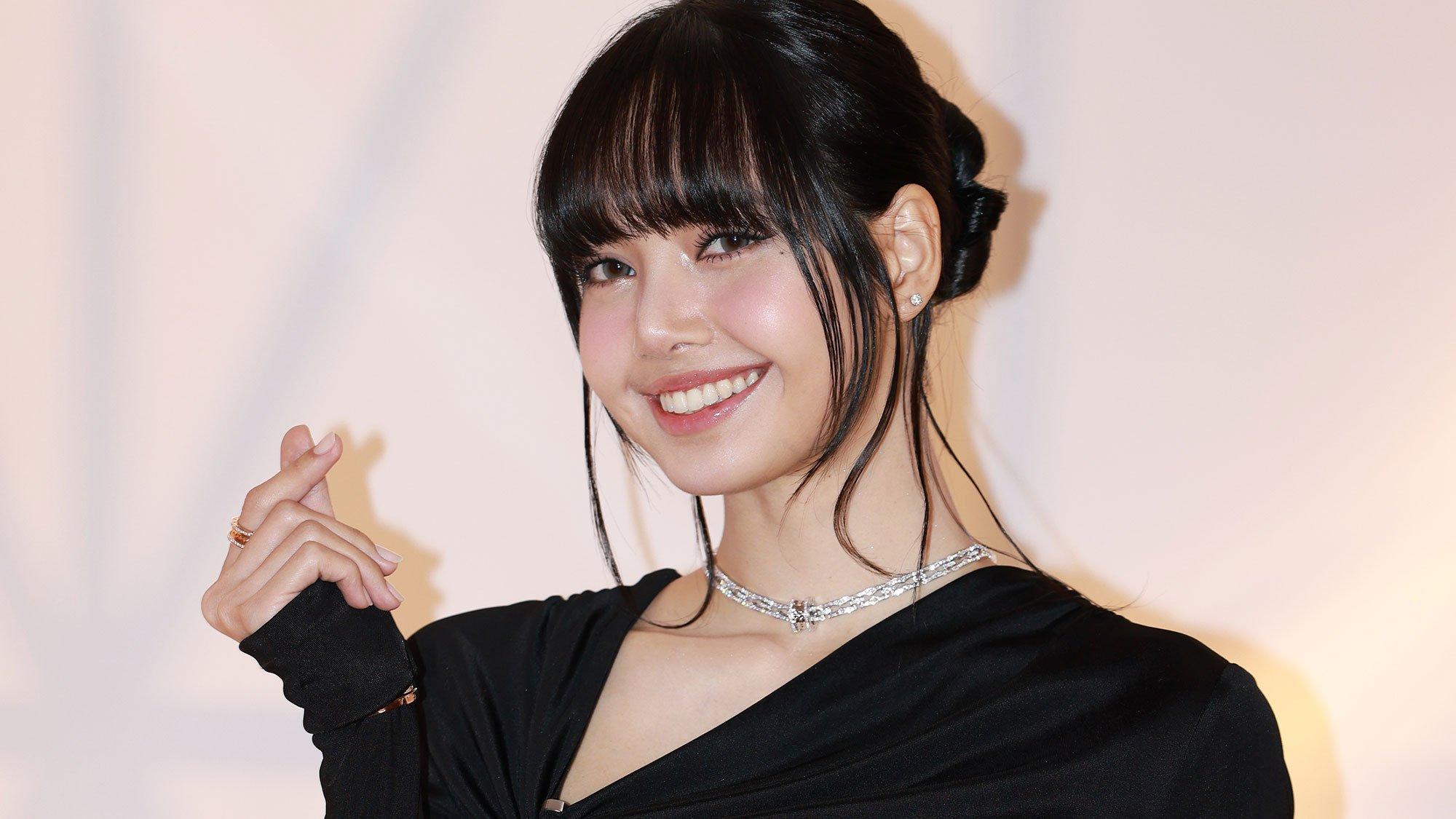
Photo: The Chosunilbo JNS/Imazins via Getty Images
list
New Music Friday: Listen To New Songs From LISA From Blackpink, Lil Nas X, Kelsea Ballerini, MC Lyte & More
Hot summer days require even hotter tunes. Here are some fresh-out-the-oven songs and albums by Hiatus Kaiyote, Lucky Daye, Headie One, Kaitlin Butts, and more.
We’ve been feeling the heat for a minute now, but summer is finally, officially, upon us.
What do you have on deck to soundtrack it? Perhaps you’re checking out Camila Cabello’s fourth offering, C,XOXO. Or Jxdn’s expectations-bucking new album, When the Music Stops. And there are so many other worthy candidates for your playlist — from Lupe Fiasco’s Samurai to Omar Apollo’s God Said No.
No matter where your stylistic compass points, this Friday release day has got something for you. As you gather your sunscreen and shades, let’s breeze through a cross-section of what’s out there.
LISA — "Rockstar"
K-pop loves its solo releases, showcasing how the various members of a group can shine individually while combining with ecstatic chemistry. Enter LISA, one-fourth of Korean titans BLACKPINK, who's already turned heads with her 2021 debut album, Lalisa.
"Rockstar" is another swing outside her main gig, featuring serrated chiptune production and LISA's commanding rap flow. The gritty, urban, futuristic video is a visual treat, and the chorus's boast of "Lisa, can you teach me Japanese?" is a multilingual flex — as well as a maddeningly unshakeable earworm.
Kelsea Ballerini & Noah Kahan — "Cowboys Cry Too"
The "Peter Pan" heavyweight and four-time GRAMMY nominee Kelsea Ballerini has called 2024 "a new chapter of music." Her collaboration with folk/pop singer/songwriter Noah Kahan, "Cowboys Cry Too," is the tip of the spear.
More than a month after the pair performed together at the 2024 Academy of Country Music Awards, their first recorded team-up is an aching, yearning ballad about breaking down a gruff exterior and revealing true emotions.
"Cowboys cry too/ They may not let 'em fall down in their hometown thinkin' they still got s*** to prove," Ballerini sings in the chorus. "That well runs deep/ But when he's showin' his skin, lettin' mе in, that's when he's toughest to mе."
Lil Nas X — "Here We Go!" (from the Netflix film 'Beverly Hills Cop: Axel F')
"So excited to release the best song of all time this friday!," Lil Nas X proclaimed on Instagram. (And on a Beverly Hills Cop soundtrack, no less!)
"Here We Go!" comes at an inflection point for the "J Christ" singer: "sorry I've been so scared with my art lately," he added in the same post. "I'm coming around to myself again. I will make you guys very proud."
This pro forma banger certainly inspires pride: tenacious lines like "I'm livin' and livin' I wanna die/ They tryna get even/ I'm beatin' the odds" will get under your skin. As for Beverly Hill Cop: Axel F, the Eddie Murphy joint will whiz to your screen July 3 via Netflix.
Lucky Daye — 'Algorithm'
Lucky Daye picked up a win for Best Progressive Album at the 2022 GRAMMYs, for Table for Two. After a slew of nominations for work with Beyoncé and Mary J. Blige, he's investigating the Algorithm.
The single "HERicane" was just a teaser, with songs like "Blame," featuring Teddy Swims; "Paralyzed," featuring RAYE;" and "Diamonds in Teal" expanding on and honing his soul-funk-R&B vision.
"Don't know pickin' sides/ 'Cause I'm rollin' in desire," he dreamily sings in the gently roiling "Diamonds in Teal." "I don't know which lie's true/ Or maybe I do, or maybe I'm you." It's a suitable mission statement wrapped in a stealthily seductive package.
Hiatus Kaiyote — 'Love Heart Cheat Code'
A jazzy, soulful, psychedelic band of Aussies, Hiatus Kaiyote has been wowing audiences for more than a decade. Whether through sampling or features, they've crossed paths with Drake, Anderson .Paak, and Beyoncé and Jay-Z.
Love Heart Cheat Code builds brilliantly on their last three albums: their 2012 debut Tawk Tomahawk, 2015's Choose Your Weapon, and 2021's Mood Valiant. Tracks like "Telescope," "Everything's Beautiful," and "Make Friends" are burbling brooks of atmosphere, groove and vibe.
Boulevards — 'Carolina Funk: Barn Burner on Tobacco Road'
Any fans of deep, pungent funk grooves should investigate Boulevards immediately. The project of mastermind Jamil Rashad, their new album Carolina Funk: Barn Burner on Tobacco Road tips its hat to yesterday's funk with a contemporary twist, bringing a refreshing spin on the well-trod template of syncopated basslines and stabbing horns.
Across highlights like "Do It Like a Maniac Part 1&2" and "Run & Move," Boulevards shows — once again — that few can nail this gritty sound quite like Rashad and crew.
Headie One — 'The Last One'
British drill-inflected MC Headie One first made a splash overseas with his 2023 debut album, Strength to Strength. Less than a year later, he's returning with The Last One.
Back in 2022, he hinted at the existence of his sophomore album in his non-album track "50s" — "The fans calling for 'Martin's Sofa'/ It might be the first single from my second," he rapped.
Helmed by that single, The Last One features Potter Payper, Stormzy, Fridayy, Skrillex, and more. The album is a leap forward in terms of production, scale and exploration.
Katlin Butts — 'Roadrunner!'
Any theater kid worth their salt knows at least a few bars from the musical "Oklahoma!"; country sensation Kaitlyn Butts has just unfolded it into an entire album.
"It's a love story but there's also a murder and a little bit of an acid-trippy feel to it at times; it's set in the same place where I come from," she said in a statement, noting she saw "Oklahoma!" with her parents every summer during childhood. "Once I got the idea for this album," she continued, "I couldn't believe I hadn't thought of it before, and it turned into something that completely encompasses who I am and what I love."
A laugh riot as well as a colorful, openhearted statement, Roadrunner! does the old Rodgers and Hammerstein chestnut good.
Read more: 5 Female Artists Creating The Future Of Country Music: Jaime Wyatt, Miko Marks & More
Amaarae — 'roses are red, tears are blue — Fountain Baby Extended Play'
Futurist Afropopper Amaarae made a gigantic splash with her second album, 2023's Fountain Baby — even Pitchfork gave it their coveted Best New Music designation.
That lush, enveloping album just got an expansion pack: roses are red, tears are blue — A Fountain Baby Extended Play is a continuation of its predecessor with six new songs. The oceanic "wanted," featuring Naomi Sharon, is a highlight, as is a remix of "Disguise" with 6LACK.
"Ooh, I'll be wanted/ I've been wanted," a pitch-shifted Sharon sings near the end, as if turning over the phrase. "Wanted" is one way to describe Amaraae's position in the music landscape.
Learn more: Meet The Latest Wave Of Rising Afrobeats Stars: AMAARAE, BNXN, Oladapo & More
MC Lyte — "King King" (feat. Queen Latifah)
The 50th anniversary of hip-hop may have come and gone, but hip-hop is forever. Today, legendary hip-hop pioneers MC Lyte and Queen Latifah continue to bear the flame of the genre as an elevating force with "King King," a conscious, uplifting offering.
"This is dedicated to all the kings and all the soon to be kings/ We're counting on you/ We love you/ This is for you, you and you and you," MC Lyte begins, while Latifah holds it down on the chorus with "This your crown hold it/ Even if it all falls down show it/ You know the world is watching now I know you get tired from keepin' it all together/ We need you."
During Women's History Month in March, MC Lyte released "Woman," the first single from her upcoming album, featuring hip-hop icons Salt (of Salt 'N Pepa), Big Daddy Kane, and R&B singer Raheem DeVaughn. MC Lyte's first new album in nearly a decade drops this summer; keep your eyes and ears peeled.
Learn more: 9 Teen Girls Who Built Hip-Hop: Roxanne Shante, J.J. Fadd, Angie Martinez & More
Latest News & Exclusive Videos

Behind Ryan Tedder's Hits: Stories From The Studio With OneRepublic, Beyoncé, Taylor Swift & More

Crowder Performs "Grave Robber"

NCT 127 Essential Songs: 15 Tracks You Need To Know From The K-Pop Juggernauts

5 Rising L.A. Rappers To Know: Jayson Cash, 310babii & More

Why Elliott Smith's 'Roman Candle' Is A Watershed For Lo-Fi Indie Folk
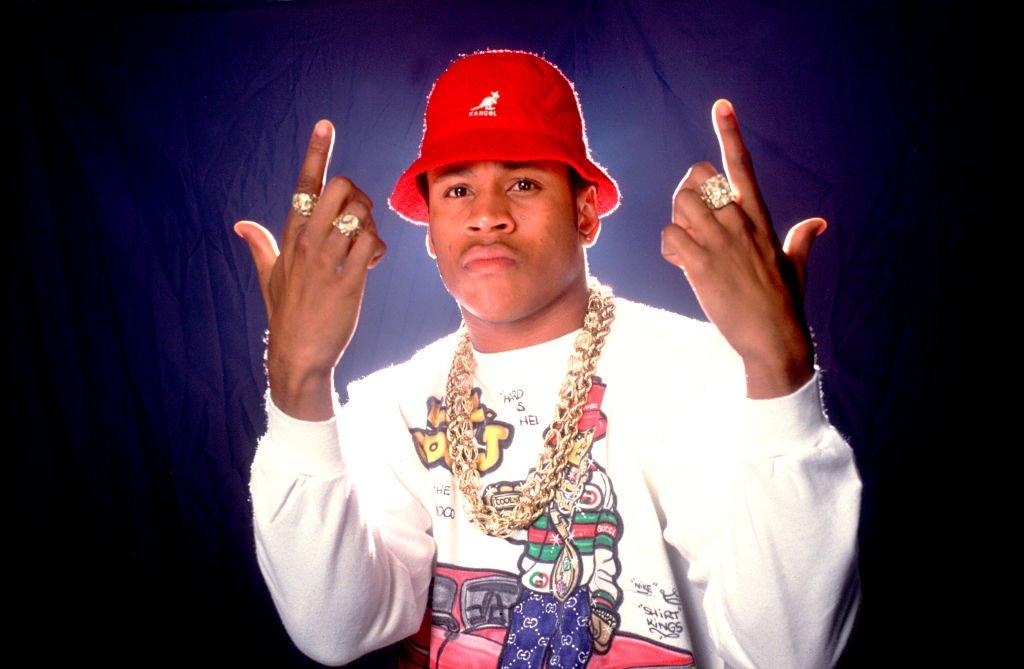
Credit: Paul Natkin/Getty Images
list
Celebrate 40 Years Of Def Jam With 15 Albums That Show Its Influence & Legacy
From the Beastie Boys' seminal 'License To Ill' and Jay-Z's 'Vol. 2… Hard Knock Life,' celebrate Def Jam with 15 of the label's essential albums.
This year marks the 40th anniversary of Def Jam Recordings, the New York label that made history in hip-hop, R&B, pop, and even thrash metal since its founding, and continues to do so today.
A label that began out of an NYU dorm room in 1984 quickly became an artistic (and business) powerhouse. Early acts like LL Cool J, the Beastie Boys, and Public Enemy were raw, adventurous, and risk-taking. Def Jam's roster opened new pathways in a still-young genre, seemingly every few months.
After that initial explosion, the label experienced a brief lull in the early 1990s when one label founder departed and the other expanded into fashion and comedy. Def Jam came roaring back beginning in 1994, and by 1998 the label was home to some of the most popular and influential artists in the game — including burgeoning megastars DMX and Jay-Z. To this day, Def Jam maintains a roster of both commercially successful and critically beloved artists in hip-hop, R&B, and pop.
To commemorate the anniversary of the label that gave us, well, pretty much everyone, here’s a list of 15 of Def Jam’s essential releases. While Def Jam brought audiences plenty of singles, EPs and remixes, this list primarily focuses on albums. Each project has a mix of artistic merit, popularity, influence and longevity, originality, and played a key role in the story of Def Jam as a whole. Think of it as a chronological run through the key albums that built one of the most lasting labels in modern music.
And finally: it must be said that in recent years, a dark shadow has begun to loom over Def Jam’s legacy. Label co-founder Russell Simmons been accused over the past seven years of numerous instances of sexual assault, dating back decades. In spite of these accusations, the label (in which Simmons hasn’t been involved for a quarter-century) remains on top, safeguarding its valuable archive while looking forward to another four decade run as fruitful as the first one.
T La Rock & Jazzy Jay - "It’s Yours" (1984)
The one single on this list is also the first piece of music ever released with the now-famous Def Jam logo. "It’s Yours" was a single produced by Def Jam co-founder Rick Rubin — his very first hip-hop production. Instrumentally, it was perhaps only comparable to Larry Smith and Def Jam co-founder Russell Simmons’ contemporaneous work with Run-D.M.C. Both "It’s Yours" and D.M.C.’s early work were severely stripped-down, consisting of a few drum sounds, an instrumental stab, and some scratches.
Lyrically, though, "It’s Yours" is worlds apart from "Sucker M.C.’s" — or pretty much anything else going on in hip-hop at the time. T La Rock, the brother of Treacherous Three member Special K, came from a family of educators, and he put every ounce of his erudition into the track. It begins, "Commentating, illustrating/ Description giving, adjective expert" and goes from there.
LL Cool J - 'Radio' (1985)
In the early 1980s, the state of the hip-hop album was very grim. Only a few existed, and they almost exclusively consisted of a few singles mixed with often-confusing filler. Two things changed that. First, Run-D.M.C.’s 1984 self-titled debut, which GRAMMY.com examined in depth a few months ago. Second was LL Cool J’s debut album Radio, the very first full-length album Def Jam ever released.
In many ways, Radio kicked off hip-hop’s Golden Age. The record shows LL, then still in his teens, as a versatile artist who can be boastful, funny, aggressive, lyrical. The album shows many different sides of his personality, and helped set the template for what a rap album could be.
Read more: 20 Iconic Hip-Hop Style Moments: From Run-D.M.C. To Runways
Beastie Boys - 'Licensed to Ill' (1986)
The Beasties would release more complex and enlightened albums than Licensed to Ill, and one of the members would eventually apologize for some of its lyrics. But there’s no denying that it was a smash hit. It was the first rap album to ever top the Billboard 200, got the group onstage with Madonna, and would eventually sell over 10 million copies.
Was some of that success due to their race? Sure. They were a credible group, signed to a hot rap label, at a time when it was still novel for white people to be performers in hip-hop. And yet, that’s not the whole story.
Licensed to Ill is a catchy, unique, energetic album, and the group members show undeniable chemistry. To this day, shout-filled, guitar-heavy anthems like "No Sleep till Brooklyn" and the ubiquitous "Fight for Your Right" can still get the party started.
Read more: The Beastie Boys Provide A License To Party
Public Enemy - 'It Takes a Nation of Millions to Hold Us Back' (1988)
There’s not too much you can say about this album that hasn’t already been said in the years of books, conferences, academic papers, and deluxe re-issues. It has ended up at or near the top of many all-time best lists. Its abrasive, collage-like approach to composition was never equalled (and, in light of current laws and practices around sampling, can never even be approached). The comic stylings of Flavor Flav bring just the right amount of levity to balance Chuck D’s takes on life-and-death issues.
Decades after its release, the album still sounds urgent. And sadly, in an America still roiled with tensions over race, incarceration, drugs, and the media, its concerns remain as relevant as ever.
Read more: 5 Things We Learned At "An Evening With Chuck D" At The GRAMMY Museum
Slick Rick - 'The Great Adventures of Slick Rick' (1988)
Slick Rick is the ultimate rap storyteller, and his debut album is the best example of his artistry. "I wrote them like an essay," Rick once said of creating the batch of songs that make up Great Adventures. He also compared it to doing stand-up. So you have exactly what those two reference points imply: stories that are well-constructed, and also frequently riotously funny.
Rick is the master of the telling detail (remember "Dave, the dope fiend shooting dope/ Who don’t know the meaning of water nor soap" from "Children’s Story"?), the humorous twist, the morality tale, the bedtime story, the character voice. His influence lives on in perhaps his most devoted protege, Ghostface Killah, as well as in any rapper who has tried to craft a song with a beginning, middle, and end.
Learn more: Essential Hip-Hop Releases From The 1980s: Slick Rick, RUN-D.M.C., De La Soul & More
Warren G - 'Regulate… G Funk Era'(1994)
A bit of an edge case here, as technically the record was put out by Violator Records and Rush Associated Labels, the latter of which was a sort of umbrella organization Def Jam ran in the mid-1990s. Many albums that could have made this list, including projects by Redman, Onyx, Domino, and Nice & Smooth, were released under the RAL banner. But Warren G’s debut, a giant hit in an era where Def Jam really needed it, became inextricably associated with the label, to the point where an article about the album on Universal Music’s website mentions Def Jam five times in the first two paragraphs.
Regulate is a pop-savvy take on the G-funk sound that was then ascendant. It was a huge success in a year that saw the introduction of tons of amazing rappers into the game. And Warren G being associated with Def Jam meant that the East Coast-centric label had expanded its geographic footprint.
Foxy Brown - 'Ill Na Na' (1996)
Def Jam wasn’t always a friendly place for female artists (despite many of the most important employees being women, including one-time president Nana Ashhurst). In fact, the label didn’t release a rap album by a woman until Nikki D’s Daddy’s Little Girl in 1991. So Foxy Brown’s impact — on Def Jam and on the rap world as a whole — cannot be overstated. Ill Na Na was an album that changed everything for female rappers. It had songs for the clubs, the block, and the radio. Foxy’s sexuality, versatility, and first-class rhyming would have an influence on countless rappers, most famously her number one fan Nicki Minaj, who has been effusively praising Foxy for more than a decade.
Read more: Ladies First: 10 Essential Albums By Female Rappers
DMX - 'It’s Dark and Hell Is Hot' (1998)
No less an authority than Nas referred to 1998 as "The year DMX took over the world." It’s Dark and Hell Is Hot is how he did it. The album set fire to Bad Boy’s so-called "shiny suit era" by embodying its polar opposite: a dark, grimy vision full of gothic synths; raspy, full-throated lyrics; and, sometimes, actual barks. Without DMX, there’s no NYC street rap return: no G-Unit mixtape run, no Diplomats.
The record is consistent and captivating from start to finish, and its thematic centerpiece comes, appropriately, about halfway through with "Damien," which reminds all of us that the most difficult battles we fight are the ones with ourselves.
Jay-Z - 'Vol. 2… Hard Knock Life' (1998)
Jay-Z has made more critically beloved albums than Vol. 2 (Reasonable Doubt and The Blueprint both fall in that category). He has made albums with bigger hits (The Blueprint 3 had a No. 1 hit with "Empire State of Mind"). But he has never made a more important LP.
Vol. 2 was the album that made Jay a superstar. Its Annie-sampling title track (produced by the late 45 King) sent him to the stratosphere — a process he actually documented on his follow-up album. But the record wasn’t just a commercial novelty. It showed Jay at the absolute top of his game: cocky, funny, and brilliant. Case in point: his novel approach to storytelling in "Coming of Age (Da Sequel)," where all the important action takes place in just a few seconds, inside the characters’ heads.
Read more: Songbook: How Jay-Z Created The 'Blueprint' For Rap's Greatest Of All Time
Ludacris - 'Word of Mouf' (2001)
Around the turn of the millennium, Def Jam had its sights set on conquering new territory. Specifically, the South. So they set up Def Jam South and hired Scarface to head it up. The entity’s biggest success came from an Atlanta DJ who went by Chris Luva Luva on the air, but began rapping as Ludacris.
Word of Mouf was Luda’s second album, but it was the one that really cemented his stardom with songs like "Rollout (My Business)," "Area Codes," and the immortal "Move Bitch" (the last of which has had an artist-approved second life as a protest chant). The album proved that the South was here to stay, and that Def Jam would have a role in determining its hip-hop future.
Learn more: A Guide To Southern Hip-Hop: Definitive Releases, Artists & Subgenres From The Dirty South
Scarface - 'The Fix' (2002)
Speaking of Scarface and Def Jam South, Face had no intention of dropping music while running the label. But, in his telling, Def Jam exec Lyor Cohen insisted on it, paying handsomely for the privilege.
"There were so many things working in my favor on that album," Scarface wrote in his memoir Diary of a Madman. "For the first time, I was working on an album for a label that believed in me 100 percent and didn’t want anything from me except for me to make the dopest album I could possibly make. And they went out of their way to make that possible."
Def Jam’s history of putting out classics inspired Face on The Fix, he writes in that book. And in the end, the album stands up there with any of them. It is one of only a small handful of rap records to earn a perfect five-mic rating from The Source, and it belongs in that rarified air with projects like Illmatic and Aquemini.
Kanye West - 'The College Dropout' (2004)
Yes, today Kanye West is the worst: a Hitler-loving, Trump-supporting, paranoid, antichoice, antisemite who stands accused of sexual harrassment. But two decades ago, the world met a Mr. West who at least seemed very different.
The College Dropout presented an artist who was already extremely well-known as a beatmaker. But Kanye’s carefully crafted persona as the bridge between mainstream rap and the underground — "First n— with a Benz and a backpack," as he put it — meant that he appealed to pretty much everyone. The College Dropout wasn't West at the top of his rap game, but it did show his skill at developing song concepts, at beats, and at creating an artistic vision so powerful, and so relatable, that it captivated an entire generation.
Cam’ron - 'Purple Haze' (2004)
It’s impossible to talk about Def Jam without discussing Roc-A-Fella. Jay-Z’s label hooked up with Def Jam in 1997, and had a years-long hot streak with artists like Kanye, Beanie Sigel, Freeway, the Young Gunz, and of course Cam’ron’s Diplomats crew — Cam, Juelz Santana, and the overall group all released projects there.
Purple Haze came at the very tail end of Roc-a-fella’s golden age. It has Cam at the absolute peak of his absurdist rhyming powers, keeping computers ‘puting and knocking out eight-syllable multis about Paris Hilton like it was nothing. During the Purple Haze era, it was Cam’s world, and we were all just lucky to be living in it.
Rihanna - 'Good Girl Gone Bad' (2007)
Rihanna’s first two projects were full of Caribbean sounds and ballads. But when her third album came along, she needed a change. Riri wanted to go "uptempo," and history shows that was the right choice. Good Girl Gone Bad began the singer’s transformation into the megastar we know today. It spawned five singles and two separate quickie tie-in albums (Good Girl Gone Bad: Reloaded and Good Girl Gone Bad: The Remixes).
"Umbrella" was the way forward. Rihanna had a No. 1 record prior, but she’d never made a sensation like this. The song (with a guest verse by then-Def Jam president Jay-Z) not only made it to the top slot, it also won a GRAMMY and was undeniably the song of the summer. The album also contained the sensation "Don’t Stop the Music," a track that kickstarted the EDM/pop hybrid that dominated the late aughts. Without Good Girl Gone Bad, it’s safe to say we’d be living in a very different, Fenty-less world.
Frank Ocean - 'Channel Orange' (2012)
One could fill a whole blurb about Channel Orange simply by quoting the extreme praise it received. "A singular achievement in popular culture." "Landed with the crash and curiousness of a meteor." Two days after its release, Pitchfork was already saying that it "feels like a classic."
And yet, somehow even that kind of acclaim doesn’t do the album justice. You really had to be there when it came out, when Frank looked into his soul and, in doing so, connected deeply with so many listeners
Read more: Frank Ocean Essentials: 10 Songs That Embody The Elusive Icon's R&B Genius
"Channel Orange is the most concentrated version of 2012 in 2012 so far," wrote Sasha Frere-Jones at the time, in one of the most dead-on statements about the album. It expressed the contradictions we all lived in. Its fragmentation mirrored the social media that was beginning to take over all of our lives. Ocean left bits of his biography scattered throughout the album, but they almost didn’t matter. He was speaking for all of us, in the way only great artists can.
A Guide To New York Hip-Hop: Unpacking The Sound Of Rap's Birthplace From The Bronx To Staten Island
PRIDE & Black Music Month: Celebrating LGBTQIA+ & Black Voices
Listen To GRAMMY.com's 2024 Pride Month Playlist Of Rising LGBTQIA+ Artists
9 New Pride Anthems For 2024: Sabrina Carpenter's "Espresso," Chappell Roan's "Casual" & More
What's The Future For Black Artists In Country Music? Breland, Reyna Roberts & More Sound Off
Why Beyoncé Is One Of The Most Influential Women In Music History | Run The World
9 Ways To Support Black Musicians & Creators Year-Round
How Beyoncé Is Honoring Black Music History With 'Cowboy Carter,' "Texas Hold Em," 'Renaissance' & More
The Evolution Of The Queer Anthem: From Judy Garland To Lady Gaga & Lil Nas X
15 LGBTQIA+ Artists Performing At 2024 Summer Festivals
50 Artists Who Changed Rap: Jay-Z, The Notorious B.I.G., Dr. Dre, Nicki Minaj, Kendrick Lamar, Eminem & More
Fight The Power: 11 Powerful Protest Songs Advocating For Racial Justice

How Rihanna Uses Her Superstardom To Champion Diversity | Black Sounds Beautiful

How Beyoncé Has Empowered The Black Community Across Her Music And Art | Black Sounds Beautiful
5 Women Essential To Rap: Cardi B, Lil' Kim, MC Lyte, Sylvia Robinson & Tierra Whack
Celebrate 40 Years Of Def Jam With 15 Albums That Show Its Influence & Legacy

Watch Frank Ocean Win Best Urban Contemporary Album At The 2013 GRAMMYs | GRAMMY Rewind
A Brief History Of Black Country Music: 11 Important Tracks From DeFord Bailey, Kane Brown & More
10 Women In African Hip-Hop You Should Know: SGaWD, Nadai Nakai, Sho Madjozi & More
10 Artists Shaping Contemporary Reggae: Samory I, Lila Iké, Iotosh & Others
The Rise Of The Queer Pop Star In The 2010s
How Sam Smith's 'In The Lonely Hour' Became An LGBTQIA+ Trailblazer
How Queer Country Artists Are Creating Space For Inclusive Stories In The Genre

How Jay-Z Became The Blueprint For Hip-Hop Success | Black Sounds Beautiful

How Kendrick Lamar Became A Rap Icon | Black Sounds Beautiful
Dyana Williams On Why Black Music Month Is Not Just A Celebration, But A Call For Respect
6 LGBTQIA+ Latinx Artists You Need To Know: María Becerra, Blue Rojo & More
7 LGBTQ+ Connections In The Beatles' Story
Breaking Down Normani's Journey To 'Dopamine': How Her Debut Album Showcases Resilience & Star Power
10 Alté Artists To Know: Odunsi (The Engine), TeeZee, Lady Donli & More

Celebrating Black Fashion At The GRAMMYs Throughout The Decades | Black Music Month
FLETCHER Is "F—ing Unhinged" & Proud Of It On 'In Search Of The Antidote'
For Laura Jane Grace, Record Cycles Can Be A 'Hole In My Head' — And She's OK With That
15 Essential Afrorock Songs: From The Funkees To Mdou Moctar
50 Years In, "The Wiz" Remains An Inspiration: How A New Recording Repaves The Yellow Brick Road
Why Macklemore & Ryan Lewis' "Same Love" Was One Of The 2010s' Most Important LGBTQ+ Anthems — And How It's Still Impactful 10 Years On
Songbook: The Complete Guide To The Albums, Visuals & Performances That Made Beyoncé A Cultural Force

Why Cardi B Is A Beacon Of Black Excellence | Black Sounds Beautiful
Queer Christian Artists Keep The Faith: How LGBTQ+ Musicians Are Redefining Praise Music
9 Revolutionary Rap Albums To Know: From Kendrick Lamar, Black Star, EarthGang & More
9 "RuPaul's Drag Race" Queens With Musical Second Acts: From Shea Couleé To Trixie Mattel & Willam
5 Black Artists Rewriting Country Music: Mickey Guyton, Kane Brown, Jimmie Allen, Brittney Spencer & Willie Jones
How 1994 Changed The Game For Hip-Hop

How Whitney Houston’s Groundbreaking Legacy Has Endured | Black Sounds Beautiful
LGBTQIA+-Owned Venues To Support Now

Celebrate The Genius Of Prince | Black Sounds Beautiful

Explore The Colorful, Inclusive World Of Sylvester's 'Step II' | For The Record
Black-Owned Music Venues To Support Now
5 Artists Fighting For Social Justice Today: Megan Thee Stallion, Noname, H.E.R., Jay-Z & Alicia Keys
Artists Who Define Afrofuturism In Music: Sun Ra, Flying Lotus, Janelle Monae, Shabaka Hutchings & More
5 Trans & Nonbinary Artists Reshaping Electronic Music: RUI HO, Kìzis, Octo Octa, Tygapaw & Ariel Zetina
From 'Shaft' To 'Waiting To Exhale': 5 Essential Black Film Soundtracks & Their Impact
5 Emerging Artists Pushing Electronic Music Forward: Moore Kismet, TSHA, Doechii & Others
5 Artists Essential to Contemporary Soca: Machel Montano, Patrice Roberts, Voice, Skinny Fabulous, Kes The Band

How Quincy Jones' Record-Setting, Multi-Faceted Career Shaped Black Music On A Global Scale | Black Sounds Beautiful
5 Black Composers Who Transformed Classical Music
Brooke Eden On Advancing LGBTQ+ Visibility In Country Music & Why She's "Got No Choice" But To Be Herself
Let Me Play The Answers: 8 Jazz Artists Honoring Black Geniuses
Women And Gender-Expansive Jazz Musicians Face Constant Indignities. This Mentorship Organization Is Tackling The Problem From All Angles.

Histories: From The Yard To The GRAMMYs, How HBCUs Have Impacted Music
How HBCU Marching Band Aristocrat Of Bands Made History At The 2023 GRAMMYs
